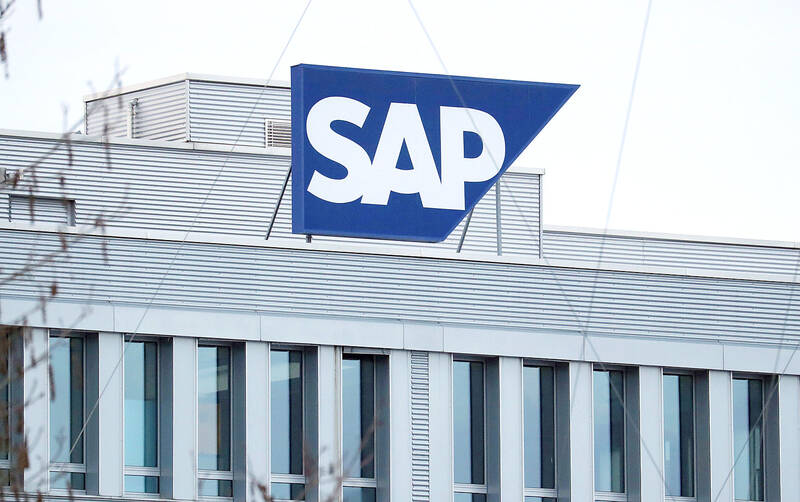SAP SE reported fourth-quarter cloud sales that slightly beat analysts’ expectations, as Europe’s biggest technology company won customers with new artificial intelligence (AI) capabilities. The company also named a suite of new executives and said it plans to simplify its strategy.
Cloud revenue in constant currencies rose 27 percent from a year earlier to 4.71 billion euros (US$4.9 billion), the Walldorf, Germany-based company said in a statement yesterday. That compares with an average estimate of 4.68 billion euros by analysts surveyed by Bloomberg.
SAP has promoted AI business services to incentivize clients to shift from legacy on-site servers to information technology infrastructure on the cloud, where average spending per client is higher. Software companies are increasingly focusing on AI agents that can complete tasks without human supervision as demand for the emerging technology grows.

Photo: Reuters
A new cheap and efficient AI model from China’s DeepSeek (深度求索) that roiled public markets on Monday was welcomed by SAP chief executive officer Christian Klein.
“This is first of all very good news for our AI strategy,” Klein said of the model in an interview on Bloomberg TV. “We said from day one on, we partner first on AI infrastructure and large language models. We believe this is becoming more and more a commodity.”
SAP raised its cloud revenue outlook for this year to 21.6 billion to 21.9 billion euros, up from a previous forecast of more than 21.5 billion euros. SAP’s current cloud backlog, which reflects sales that will be booked over the next twelve months, grew 29 percent in constant currencies to 18.1 billion euros.
Half of SAP’s deals in the fourth quarter had AI embedded, Klein said.
SAP’s strategy helped propel the software firm to become Europe’s most valuable technology company last year, leapfrogging Dutch chip machine maker ASML Holding NV.
The company also announced changes to its executive ranks and board after a number of departures last year that consolidate more control directly under Klein.
Former Boston Consulting Group partner Sebastian Steinhauser, who is SAP’s chief strategy officer, was elevated to the executive board to oversee strategy and operations, SAP said in a separate statement yesterday.
He would be asked to simplify the company’s inner workings and work with new chief marketing officer Ada Agrait to promote a unified strategy to customers, it said.
Philipp Herzig, who has led SAP’s AI efforts, was named chief technology officer. He takes over from Jurgen Muller, who left the company in September last year after what he called “inappropriate” behavior at a company event.
Jan Gilg is to run sales in the US, SAP’s biggest market, and Manos Raptopoulos is to cover Europe, the Middle East and Asia.
Herzig, Gilg and Raptopoulos are to report to Klein. The appointments are effective on Feb. 1.

South Korea’s equity benchmark yesterday crossed a new milestone just a month after surpassing the once-unthinkable 5,000 mark as surging global memory demand powers the country’s biggest chipmakers. The KOSPI advanced as much as 2.6 percent to a record 6,123, with Samsung Electronics Co and SK Hynix Inc each gaining more than 2 percent. With the benchmark now up 45 percent this year, South Korea’s stock market capitalization has also moved past France’s, following last month’s overtaking of Germany’s. Long overlooked by foreign funds, despite being undervalued, South Korean stocks have now emerged as clear winners in the global market. The so-called “artificial intelligence

‘SEISMIC SHIFT’: The researcher forecast there would be about 1.1 billion mobile shipments this year, down from 1.26 billion the prior year and erasing years of gains The global smartphone market is expected to contract 12.9 percent this year due to the unprecedented memorychip shortage, marking “a crisis like no other,” researcher International Data Corp (IDC) said. The new forecast, a dramatic revision down from earlier estimates, gives the latest accounting of the ongoing memory crunch that is affecting every corner of the electronics industry. The demand for advanced memory to power artificial intelligence (AI) tasks has drained global supply until well into next year and jeopardizes the business model of many smartphone makers. IDC forecast about 1.1 billion mobile shipments this year, down from 1.26 billion the prior

NEW IDENTITY: Known for its software, India has expanded into hardware, with its semiconductor industry growing from US$38bn in 2023 to US$45bn to US$50bn India on Saturday inaugurated its first semiconductor assembly and test facility, a milestone in the government’s push to reduce dependence on foreign chipmakers and stake a claim in a sector dominated by China. Indian Prime Minister Narendra Modi opened US firm Micron Technology Inc’s semiconductor assembly, test and packaging unit in his home state of Gujarat, hailing the “dawn of a new era” for India’s technology ambitions. “When young Indians look back in the future, they will see this decade as the turning point in our tech future,” Modi told the event, which was broadcast on his YouTube channel. The plant would convert

People stand in a Pokemon store in Tokyo on Thursday. One of the world highest-grossing franchises is celebrated its 30th anniversary yesterday.